Jiufen Old Street
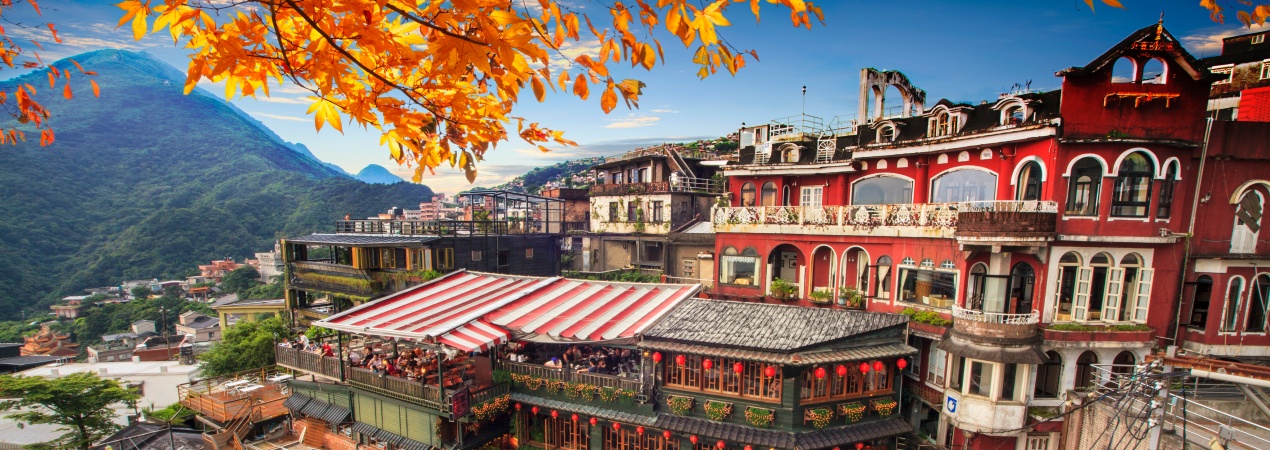
In Ruifang District, New Taipei City, Taiwan, China, lies Jiufen Old Street. Gold mining made it thrive in earlier times, and it got noticed again later because the movie A City of Sadness was filmed there. The architectural style from the Japanese colonial period is kept on the old street. Houses are built along the mountain slope, which creates a one-of-a-kind sight with narrow streets and steep stone steps.
- Chinese Name: 九份老街 Jiǔ Fèn Lǎo Jiē
- Recommended Duration: 2-3 hours
- Entrance Fee: Free
- Opening Hours: Year-round. Shops in the core area are usually open from 10:00 to 20:00
- Best Time to Visit: September to November
- Address: Jishan Street, Ruifang District, New Taipei City, Taiwan
-
How to Get There:
By Train + Bus: Take the Taiwan Railways from Taipei Main Station to Ruifang Station, then transfer to buses such as 788, 827, or 1062 to reach Jiufen Old Street directly (about 15 minutes' ride)
By Direct Bus: Take Keelung Bus Route 1062 from Zhongxiao Fuxing Station of Taipei MRT to reach Jiufen directly (about 90 minutes' ride); take Bus Route 965 from Fuzhong Station of Banqiao MRT
Highlights of Jiufen Old Street
Jishan Street
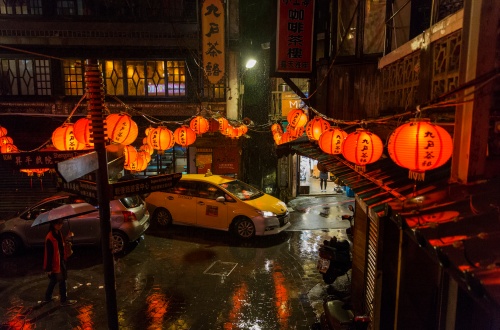 Jishan Street at night
Jishan Street at nightAs the core thoroughfare of Jiufen Old Street, Jishan Street carries the strongest local vibe of this mountain town and memories of its "golden age," making it a must-visit first stop for tourists. The food here is a microcosm of Taiwan's traditional flavors: "Yuwan Bozai," a shop with over 60 years of history, serves hand-made fish ball soup using fresh fish paste—its rich umami bursts in your mouth with every bite. "Granny Lai's Taro Balls" offers chewy and firm sweet potato balls and taro balls, which are classics whether paired with shaved ice or warm syrup. Along the street, you can also find small stores selling gold-mining themed cultural products and Japanese-style groceries. When you get tired from walking, stop by an old tea stand on the corner for a cup of Dongding Oolong tea and savor the slow pace of the mountain town.
Shuqi Road
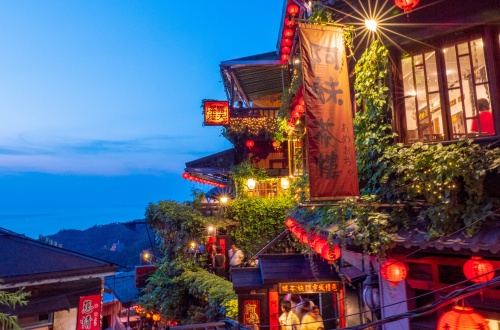 A-Mei Teahouse
A-Mei TeahouseShuqi Road is a Jiufen landmark. It's famous for its special "丰"-shaped staircases and lots of red lanterns, and it also inspired the bathhouse scene in Hayao Miyazaki's Spirited Away. Turn from Jishan Street into Shuqi Road, and layers of stone steps and hanging red lanterns will surround you right away. On misty mornings or when dusk comes, the lit lanterns make you feel like you're walking into the animation's magical world. "A-Mei Teahouse" is the best part of this road. It's a teahouse with both Chinese and Japanese styles. It was used to film A City of Sadness, and its rooftop viewing spot is great for looking at the mountains and sea. Get a pot of high-mountain tea and a piece of mung bean cake here—you can see the shiny waves of Keelung Harbor and the tidy houses of the mountain town.
Shengping Theater
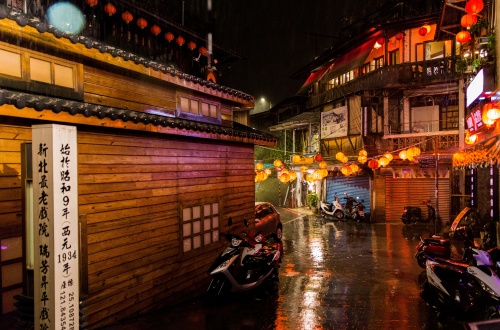 Shengping Theater
Shengping TheaterShengping Theater was built in 1914. It's a living relic of Taiwan's early cinemas, and it has seen Jiufen change from a big gold-mining town to a cultural landmark. Now it's a place tourists must visit to feel a nostalgic mood. This two-story building has stone on the first floor and wood on the second. Its baroque-style outside decorations have been worn by the years, but you can still see how nice they were. Anyone can visit the theater for free. When you walk in, it feels like you're going back in time: the old ticket booth still has its small window, and there's a commemorative stamp nearby for visitors to use. The wooden seats inside used to be six in a row, but now they're seven or eight. Around the over 200 seats left, things like old projectors and fridges are on show.
Educational Value
Jiufen Old Street lets you touch the "gold mining era" in northern Taiwan—it saves a past industrial civilization you can feel. Gold mining made Jiufen a busy "gold rush town" from the late 1800s to the mid-1900s. Miners came together, and many businesses opened there. Now, the old street's layout, how its buildings look, and small daily things all show clear marks of that time.
Activities to do at Jiufen Old Street
Handicraft Experiences on Jishan Street
Pick a piece of indigo cloth at a printing and dyeing shop on Jishan Street, or ask the shopkeeper to carve your name on a black pebble—these items with the mountain town's mark are more meaningful as souvenirs. If you have enough time, join a handicraft class organized by the community. Learn to make ore pendants from local artists, or try making traditional rice cakes. As you knead and shape the dough, you'll get a feel for the local people's life wisdom.
Drop us a line and we'll connect you with the top China expert in no time!
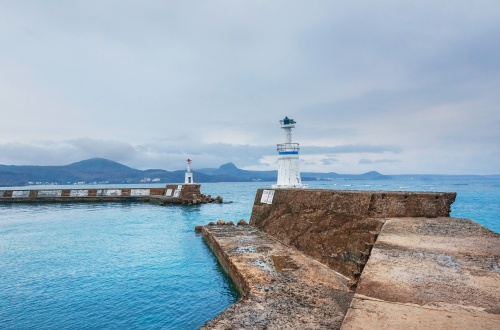 Kenting National Park
Kenting National Park 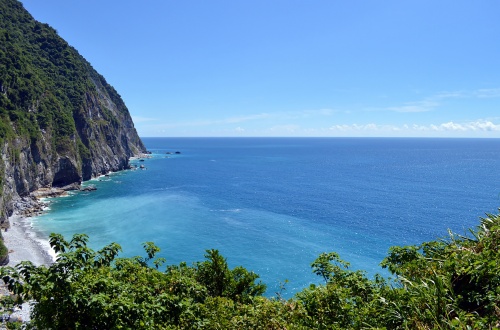 Taroko National Park
Taroko National Park 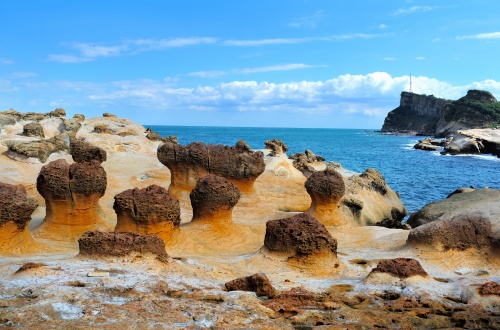 Yehliu Geopark
Yehliu Geopark 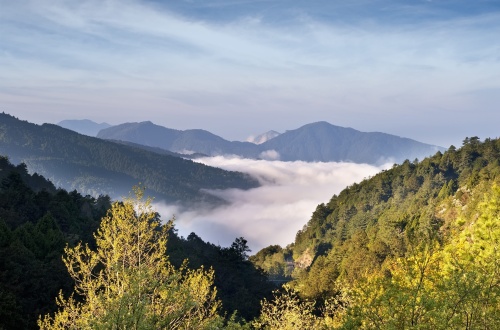 Alishan
Alishan